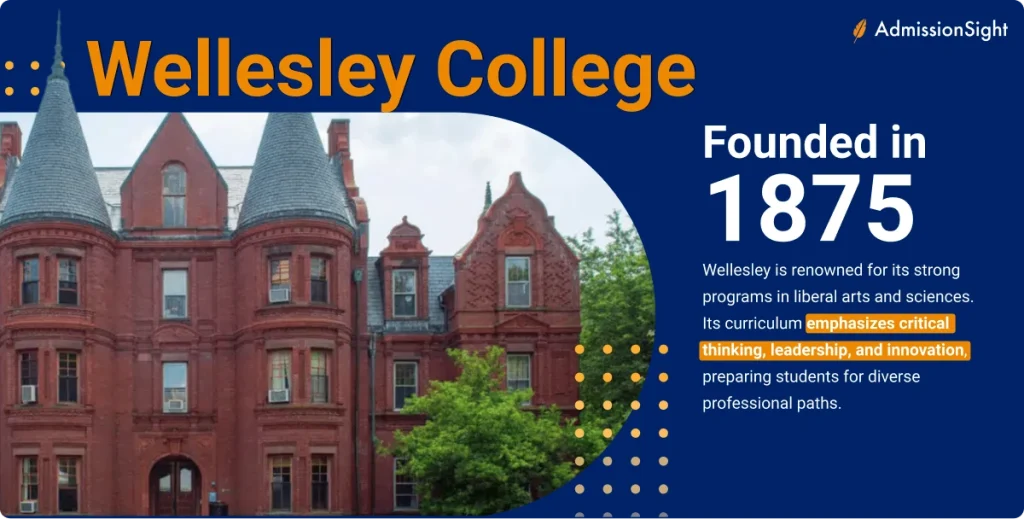Thinking about how to get into Wellesley College? You’re eyeing one of the top women’s colleges and best liberal arts colleges out there! Wellesley excels in academics, especially in political science, economics, and STEM, with a tight-knit, supportive community and socially driven students. Plus, its location just outside of Boston means you’ve got access to endless opportunities, whether it’s internships, research, or even just enjoying the city’s culture.
But, fair warning: getting in isn’t easy. With an acceptance rate of just 14.1% for the Class of 2028, Wellesley is pretty selective. They’re looking for students who have a deep curiosity about the world and a real drive to make an impact. It’s all about finding that balance between academic strength and personality, so you stand out in the right way.
Don’t stress though! In this guide, we’ll cover everything you need to know about how to get into Wellesley, from GPA expectations to how to show off your strengths in your application. Let’s jump in and help you put your best foot forward!
- How Hard Is It to Get into Wellesley College?
- Wellesley Admission Requirements
- Wellesley College GPA Requirements
- Wellesley SAT Scores
- Wellesley ACT Scores
- How to Increase Your Chances of Getting into Wellesley
- Wellesley Application Deadlines
- Frequently Asked Questions
- Takeaways
How Hard Is It to Get into Wellesley College?
Wellesley College is known for being highly selective. For the Class of 2028, the school received 8,714 applications and admitted just 1,224 students, which gives it an acceptance rate of 14.1%. As you can imagine, it’s a competitive process with many top students vying for a spot.
Here’s a look at how Wellesley’s acceptance rate has changed in recent years:
|
Wellesley Class |
Acceptance Rate |
| Class of 2024 |
20.4% |
|
Class of 2025 |
16% |
| Class of 2026 |
13.6% |
|
Class of 2027 |
13.9% |
| Class of 2028 |
14.1% |
As you can see, the rate has fluctuated between 13% and 20% in recent years. The biggest drop happened between the Class of 2024 and Class of 2026, when it dropped from 20.4% to 13.6%. Every year, more students are applying, and with Wellesley being such a top choice, the competition just keeps getting tougher.
With around 8,000 students applying and only a limited number of spots, it’s super important to make your application stand out. If you’re thinking about how to get into Wellesley, focus on showing who you are and what makes you a great fit. It’s all about finding that balance between your grades, personality, and what you’ll bring to the table.
Wellesley Admission Requirements
Wellesley looks for students who are curious, driven, and well-equipped to take on academic challenges. The admissions team evaluates applications holistically, meaning they consider more than just numbers. Here’s what you need to know about the application requirements:
- High school transcript. Wellesley wants to see that you’ve challenged yourself with rigorous coursework. Most successful applicants take honors, AP, IB, or advanced classes in high school.
- Recommendation letters. Wellesley requires two letters of recommendation from teachers who know you well. Choose someone who can speak to your academic ability, work ethic, and character.
- Personal statement. Wellesley accepts either the Common Application or the Coalition Application, both of which require a personal statement. This is your chance to showcase your personality, experiences, and what makes you a great fit for Wellesley.
- Supplemental essay. Wellesley requires a supplemental essay. The essay asks you to respond to a Wellesley-specific question, which gives the admissions team a deeper understanding of your academic interests and how you fit into the Wellesley community.
- Standardized test scores (optional). Wellesley is test-optional, so submitting SAT or ACT scores is up to you. If your scores strengthen your application, you can include them, but if not, Wellesley will evaluate your application without them.
- Mid-year and final transcripts. Your senior year matters. Wellesley requires a mid-year report with your first-semester grades and a final transcript after graduation to make sure you maintained strong academic performance.
- Extracurricular activities. Wellesley looks for students who are involved in their communities, whether through school clubs, sports, research, internships, or other meaningful activities.
- Portfolio (optional). If you have a special talent in the arts, you might want to submit an arts portfolio. Wellesley’s art, music, and theatre departments accept electronic submissions of portfolios, recordings, or presentations. Please note that Wellesley does not have a dance department and does not review creative writing materials.
The most important factors in the admissions process at Wellesley include the rigor of your high school coursework, your GPA, recommendation letters, and your application essay. These elements carry the most weight in showcasing your academic abilities and potential as a student at Wellesley.
Beyond academics, Wellesley also values extracurricular activities, talents, character, and personal qualities. They want students who are not only strong in the classroom but also engaged in their communities and passionate about their interests.
Work experience, first-generation status, and volunteer work are also considered factors in the admissions process. While these factors may not weigh as heavily as academic ones, they can definitely help strengthen your application and show what makes you unique.
Alumni relations, state residency, and geographical residence are considered but are not major influences in admissions decisions. Religious affiliation is not considered at all, so it will not impact your chances of being admitted.
Ultimately, Wellesley is looking for students who are academically driven, intellectually curious, and eager to contribute to the Wellesley community. Knowing how to get into Wellesley means crafting an application that highlights both your academic achievements and the personal qualities that make you stand out.
High school coursework recommendations
When applying to Wellesley, your high school transcript is one of the first things the admissions team looks at. To stay competitive, you should aim for a well-rounded course load that shows you’ve challenged yourself. While Wellesley doesn’t have strict requirements, here’s the recommended coursework to help guide you:
- 4 units of English
- 4 units of Mathematics
- 3 units of Science(including at least 2 units of lab)
- 4 units of Foreign Language
- 4 units of Social Studies
- 4 units of History
This adds up to 23 recommended academic units, but the more advanced coursework you take, the better. If your school offers AP, IB, honors, or dual-enrollment courses, it’s definitely a good idea to take advantage of them to stand out.
Wellesley College GPA Requirements
Wellesley doesn’t have an official minimum GPA requirement for admission, but given its competitive applicant pool, you will need a strong academic record to be a serious contender. Aiming for a GPA around 3.98 will put you in a competitive position.
Wellesley College average GPA
Although Wellesley does not publish GPA data, aiming for a GPA close to 3.98 will place you in a competitive range. For students who reported class rank, Wellesley admits were generally at the top of their high school classes:
- 90% ranked in the top 10%
- 99% ranked in the top 25%
- 100% ranked in the top 50%
This data confirms that Wellesley looks for students with exceptional academic performance. However, GPA is only one part of the admissions process. Wellesley takes a holistic approach, meaning that factors such as extracurricular activities, leadership experience, recommendation letters, and essays also play a role in the final decision.
If your GPA is not as high as you would like, do not panic. Understanding how to get into Wellesley means knowing that taking rigorous courses, excelling in other areas, and submitting a compelling application can still put you in a strong position.
Wellesley SAT Scores
Wellesley is test-optional, meaning you don’t have to submit SAT scores if you don’t want to. However, if you choose to send them, your scores should be strong to stay competitive. High SAT scores can help demonstrate academic readiness and may strengthen your application.
Wellesley College average SAT
According to Wellesley’s Common Data Set for 2024-2025, here are the typical SAT scores for admitted students:
|
25th Percentile SAT Composite Score |
50th Percentile SAT Composite Score | 75th Percentile SAT Composite Score |
| 1470 | 1520 |
1550 |
Here’s a breakdown of section scores:
|
Section |
25th Percentile Score | 50th Percentile SAT Composite Score | 75th Percentile SAT Composite Score |
| SAT Evidence-Based Reading and Writing (EBRW) | 730 | 750 |
770 |
|
SAT Math |
740 | 770 |
790 |
Most admitted students score in the upper ranges of the SAT. Looking at section scores:
- 92.34% of students scored between 700-800 in SAT EBRW.
- 89.52% of students scored between 700-800 in SAT Math.
To stay competitive, aim for a 1550 or higher, with strong scores in both Math and EBRW. If you’re figuring out how to get into Wellesley, a score in this range can show that you’re ready to handle the college’s rigorous academics.
That said, don’t panic if your scores aren’t perfect. Wellesley evaluates applications holistically, so your coursework, extracurriculars, essays, and recommendation letters all matter in the final decision. If your SAT scores are close but not quite there, consider retaking the test to boost your chances.
Does Wellesley require the SAT?
Nope! Wellesley is test-optional, so it’s entirely up to you whether or not to submit your SAT scores. If you have a strong score, sending it could give your application a little extra boost. But if your scores aren’t quite where you want them to be, don’t worry. Leaving them out won’t hurt your chances.
Wellesley ACT Scores
Wellesley does not require the ACT, but if you choose to submit your scores, they should be strong to stay competitive. A high ACT score can help showcase your academic abilities, but keep in mind that Wellesley is test-optional, so it’s entirely up to you whether to include them in your application.
Wellesley average ACT
Here’s a look at the ACT scores for admitted students based on Wellesley’s latest Common Data Set:
|
25th Percentile ACT Composite Score |
50th Percentile ACT Composite Score | 75th Percentile ACT Composite Score |
| 33 | 34 |
35 |
As for the subject breakdown:
|
Section |
25th Percentile Score | 50th Percentile Score | 75th Percentile Score |
| ACT English | 34 | 35 |
35 |
|
ACT Math |
29 | 32 | 34 |
| ACT Reading | 34 | 35 |
36 |
|
ACT Science |
31 | 34 |
35 |
Most admitted students score between 30 and 36 on the ACT. Looking at section scores:
- 94.34% of students scored between 30 and 36 in ACT English.
- 74.53% of students scored between 30 and 36 in ACT Math.
- 99.06% of students scored between 30 and 36 in ACT Reading.
- 87.74% of students scored between 30 and 36 in ACT Science.
To stay competitive, aim for a 35 or higher. However, if your score is not quite there, don’t stress too much. Wellesley evaluates applications holistically, so your coursework, extracurriculars, essays, and recommendations all matter. If you’re thinking about how to get into Wellesley, remember that you can still stand out in meaningful ways even without a perfect test score.
Does Wellesley prefer the ACT or SAT?
Wellesley doesn’t play favorites when it comes to the SAT or ACT. Whether you choose to take one, both, or neither is completely up to you. Since Wellesley is test-optional, submitting your scores is your call.
Looking at the numbers, 43% of applicants submitted SAT scores, while 18% submitted ACT scores. This shows that a good number of students either skipped submitting test scores or chose to focus on other aspects of their application, which aligns with Wellesley’s focus on more than just test results.
The best part? Wellesley superscores both tests. This means they’ll take your highest scores from each section, even if they come from different test dates, to give you the best composite score. If you’ve taken the SAT or ACT more than once, they’ll make sure to use your best scores. So, if you choose to submit, be sure to send in your top results.
How to Increase Your Chances of Getting into Wellesley
Getting into Wellesley is competitive, but don’t worry! A strong application can set you apart. If you want to understand how to get into Wellesley, let’s break down what really matters.
1. Keep that GPA looking solid.
Your GPA is a big deal at Wellesley. If you want to be a competitive applicant, aim for around 3.98 or higher. While there’s no exact cutoff, the students who get in tend to have a GPA that reflects their academic drive and readiness for Wellesley’s tough courses. Taking challenging courses like AP or honors will definitely help too.
Don’t panic if your GPA isn’t perfect, though. Wellesley values growth. If you’ve had to work hard to bring up your grades in certain subjects, make sure you mention it in your application. It shows resilience and a willingness to improve, which is exactly what Wellesley likes to see.
If a class is giving you trouble, don’t hesitate to get some help. Whether it’s a tutor, study group, or even just asking your teacher for a bit of extra guidance, taking the initiative will show Wellesley that you’re serious about your success.
2. Submit SAT/ACT scores if they’re going to help you.
Since Wellesley is test-optional, you get to decide if you want to send in your SAT or ACT scores. If you think your scores are strong and will add to your application, go ahead and submit them!
For context, the middle 50% of admitted students typically have SAT scores between 1470-1570 or ACT scores between 33-35.
To make the biggest impact, aim for scores in the top 25%—that means 1550+ on the SAT or a 35 on the ACT. If your scores are below that, don’t worry. You can still make your application shine with other strengths.
And remember, if you’re not happy with your results, retaking the test, doing some practice exams, or getting a bit of extra help from a private tutor can boost your score. Wellesley also superscores both the SAT and ACT, which means they’ll take your highest section scores across different test dates. So, if you’ve taken either test multiple times, you’ve got a chance to show off your best work.
The key takeaway here? Don’t stress about testing. If you’re figuring out how to get into Wellesley, remember that the admissions team looks at your entire application—your grades, activities, essays, and recommendations all play a big role.
3. Show Wellesley who you are with your essay.
Wellesley requires you to submit a personal statement and a school-specific essay. The personal statement can come from The Common Application or the Coalition Application, while the Wellesley essay focuses on your unique experiences and contributions.
Here’s the Wellesley supplemental essay prompt:
- Wellesley students actively seek ways to build bridges and to change the world for the better. Tell us about an experience working with and alongside people of different backgrounds and/or perspectives from your own. Why was this important to you, and what lessons from this will you bring with you to Wellesley?
The essay should be between 250 to 400 words.
If you’re unsure where to start, think about moments when you learned something new by working alongside others who brought different viewpoints or lived experiences. Did you work with someone whose ideas challenged yours? Or perhaps you learned a lot by helping someone understand a different perspective. These types of experiences are perfect to highlight in your essay.
Tips for writing a great Wellesley supplemental essay:
- Start with a clear background. Make sure to open with your background or perspective. This could relate to your culture, race, education, or even your family background. You can also touch on your unique experiences, like being a part of the LGBTQ+ community or taking a gap year. Just make sure the reader understands where you’re coming from.
- Show how you’ve connected with others. The essay asks you to reflect on working with people who have different perspectives. Think about times when you worked with others who had different backgrounds or views. How did you connect? Did you lead a project or have a conversation that brought people together? Show how you worked through differences and what you learned.
- Tie it back to Wellesley. Now, make it clear how these experiences will help you at Wellesley. They value diverse perspectives, so use your essay to highlight what you’ll bring to their community. If there’s a specific club, class, or aspect of Wellesley that excites you, mention it! Show them that you’ve thought about how you’ll contribute to the campus.
- Be personal and specific. Don’t just write generic answers. Wellesley wants to see who you are, so be specific about your actions and how they shaped you. For example, talk about a program that excites you or a community you want to be a part of.
Your essay is your chance to really connect with the admissions team and share what makes you you. So, take your time with it! Craft a response that feels authentic and gives them a sense of who you are, what you care about, and what you’ll bring to their community.
Need more help with your essay? Check out our go-to guide on Wellesley’s essays!
4. Make your extracurriculars shine.
Wellesley wants to see what you’ve done beyond just participating in clubs. They care about the difference you made, whether through leadership, community service, or creative passions. If you’re thinking about how to get into Wellesley, focus on showing the impact of your involvement—not just the list of activities.
- Leadership roles. If you’ve taken on leadership roles such as being a club president, student government member, or founder of a new initiative, highlight the specific actions you took and the impact they had. Programs like the National Student Leadership Conference can help showcase your leadership.
- Community service and advocacy. Wellesley values students who are committed to helping others. Whether you volunteered with an organization or worked on a social justice project, share how your involvement made a tangible difference. Programs like Habitat for Humanity or Startup UCLA can demonstrate your dedication to service.
- STEM and research. If you’ve participated in any STEM-related projects or research, be sure to explain what you worked on and what you learned. If you joined programs like Girls Who Code, The CURIE Academy, or participated in local science fairs, those can showcase your dedication to science and tech.
- Creative arts. Whether you’re passionate about theater, music, dance, or visual arts, Wellesley looks for students who express themselves creatively. If you’ve performed in a school play, submitted artwork to competitions, or composed original music, be sure to mention it. Programs like the Scholastic Art & Writing Awards are great for highlighting your artistic accomplishments.
- Entrepreneurship. If you started a business, launched a nonprofit, or ran a creative project, share what motivated you and what you learned along the way. Programs like the Conrad Challenge for high school entrepreneurs can demonstrate your entrepreneurial drive.
- Sports and athletics. Whether it was through a high school sport, a club team, or even a community league, participating in athletics can show leadership, perseverance, and teamwork. If you were part of a competitive team or overcame a personal challenge, mention it. Programs like AAU Basketball or US Youth Soccer can highlight your athletic commitment.
- Diversity and cultural initiatives. Wellesley appreciates students who embrace diversity and work to make a positive impact. If you participated in cultural heritage clubs, organized diversity events, or joined conversations on inclusion, share your efforts. Initiatives that promote understanding align with Wellesley’s values of inclusivity.
Wellesley is interested in students who contribute to their communities and bring a unique perspective. Show how your extracurriculars align with your values and how you’ve gone beyond simply joining activities by actively making a difference.
5. Secure strong recommendation letters.
Wellesley asks for two recommendation letters from teachers, so take your time choosing the right ones. These letters help give the admissions team a fuller picture of who you are by highlighting how you’ve grown, how you work with others, and your strengths as a student.
Tips for strong recommendation letters:
- Choose teachers who really know you. Pick teachers who can speak to your academic abilities and personal growth. Maybe they’ve seen how you’ve taken on challenges or stepped up in class discussions.
- Be open about your goals. Let your teachers know what excites you academically and where you want to go. It’ll help them write a letter that feels more personal and meaningful.
- Give them time. Teachers are busy, so be sure to ask early enough for them to write a thoughtful letter. Try to ask at least a month before your deadline. The more time they have, the better your letter will be.
- Give them the details. Share some of your biggest accomplishments, class projects, or contributions so they can highlight specific moments where you’ve made an impact.
- Show your gratitude. A simple thank-you note or a small token of appreciation can really go a long way. It not only shows your appreciation but also strengthens your connection with your recommender.
Remember, Wellesley only requires two recommendation letters, and they prefer you focus on getting strong ones from your teachers rather than sending additional letters.
6. Consider applying Early Decision (ED).
If Wellesley is at the top of your list, applying Early Decision could give you a leg up. For the Fall 2024 admissions cycle, Wellesley received 1,033 ED applications and admitted 308 students, resulting in an ED acceptance rate of 29.82%. This is significantly higher than the overall acceptance rate of 14.1%.
If you’re certain that Wellesley is your first choice, applying ED might be a good option to boost your chances of getting in. Understanding how to get into Wellesley includes knowing when Early Decision can give your application an edge.
ED shows the admissions team that you’re fully committed to attending Wellesley, and schools appreciate that level of certainty. It can sometimes work in your favor. However, keep in mind that ED is binding, meaning if you’re admitted, you must enroll and withdraw any other college applications.
Before you commit, make sure that Wellesley is the perfect fit for you academically, socially, and financially. Take time to discuss it with your family, look into financial aid options, and make sure you’re prepared to make that commitment.
ED can be a great strategy if you’re 100% confident that Wellesley is where you want to spend the next few years. Just make sure you’re fully ready to take that next step, as it’s a big decision to commit so early!
Wellesley Application Deadlines
Understanding how to get into Wellesley means staying on top of deadlines. Whether you’re applying Early Decision I, Early Decision II, or Regular Decision, knowing these key dates will help you avoid last-minute stress and put together your best application.
|
Date |
Event |
| August 1 |
Application Start |
|
November 1 |
Early Decision I Deadline |
| December 1 |
Early Decision I Notification |
|
January 1 |
Early Decision II Deadline |
| February 15 |
Early Decision II Notification |
|
January 8 |
Regular Decision Deadline |
| April 1 |
Regular Decision Notification |
|
May 1 |
Reply Date (College Decision Day) |
The best way to stay on track? Mark these dates, set reminders, plan ahead, and give yourself plenty of time to craft a solid application. A little organization can save a lot of stress later!
Frequently Asked Questions
1. Can I get into Wellesley with low test scores?
Yes! Wellesley has a test-optional policy, which means you’re not required to submit SAT or ACT scores. If standardized testing isn’t your strong point, don’t stress. Your application will still be reviewed holistically. Focus on showcasing your strengths in other areas like your GPA, extracurriculars, and essays.
However, if you choose to include your test scores, aiming for a solid score—around 1500+ on the SAT or 34+ on the ACT—will keep you competitive. If your scores are a little lower than you’d like, consider retaking them to boost your chances.
2. What GPA do I need to get into Wellesley?
Wellesley doesn’t have a strict GPA requirement, but for a competitive application, it’s best to aim for a GPA in the range of 4.0 or higher. Most admitted students are at the top of their class and have completed rigorous coursework like AP or honors classes.
If your GPA is a bit lower, don’t worry! Wellesley takes a holistic approach to admissions, meaning they also consider your extracurricular activities, leadership roles, and letters of recommendation, which can help strengthen your application.
3. Does applying Early Decision improve my chances of getting in?
Yes! Applying ED can definitely boost your chances. For the Fall 2024 admissions cycle, Wellesley received 1,033 ED applications and admitted 308 students, which gives an ED acceptance rate of 29.8%. This is notably higher than the overall acceptance rate of 14.1%.
Just keep in mind that ED is binding. This means that if you’re accepted, you’re committed to attending Wellesley and must withdraw any applications to other schools. Make sure you’re 100% confident that Wellesley is the right fit for you before making this commitment.
4. Is Wellesley test-optional?
Yes, Wellesley follows a test-optional policy. You can choose to submit your SAT or ACT scores if you think they’ll strengthen your application. But if standardized tests aren’t your strength, it won’t hurt your chances to leave them out. Wellesley reviews applications holistically and focuses on things like your academic record, extracurricular activities, essays, and recommendations.
5. How much does it cost to attend Wellesley?
For the 2024-2025 academic year, Wellesley’s tuition is $66,880 per year. When you add on housing, meals, and personal expenses, the total cost of attendance comes out to about $92,060.
But don’t let the price tag discourage you! Wellesley offers need-based financial aid and merit scholarships to help make education more affordable. Be sure to explore the financial aid options when applying.
Takeaways
Thinking about how to get into Wellesley College? Here’s what you should keep in mind to put your best foot forward:
- With an acceptance rate of 14.1%, Wellesley is highly competitive. To stand out, make sure your application highlights your curiosity, leadership, and the ways you’ve actively contributed to your school and community.
- Aiming for a GPA of 3.89 or higher while taking on challenging courses like AP, IB, or honors classes will show that you’re prepared for the academic rigor Wellesley offers.
- Test scores are optional, but if you decide to submit them, aim high. A competitive SAT score is 1550+, and an ACT score of 35+ will help you stand out.
- Your essays and extracurriculars are your chance to tell your story. What have you achieved? How have you grown? Wellesley is looking for students who are engaged in their communities, think critically, and bring unique perspectives to campus.
- Still unsure about how to get into Wellesley? Don’t worry! A college admissions consultant can help make things easier. With a well-crafted strategy, you can make sure your application makes the best impression on Wellesley’s admissions team.

Eric Eng
About the author
Eric Eng, the Founder and CEO of AdmissionSight, graduated with a BA from Princeton University and has one of the highest track records in the industry of placing students into Ivy League schools and top 10 universities. He has been featured on the US News & World Report for his insights on college admissions.
























